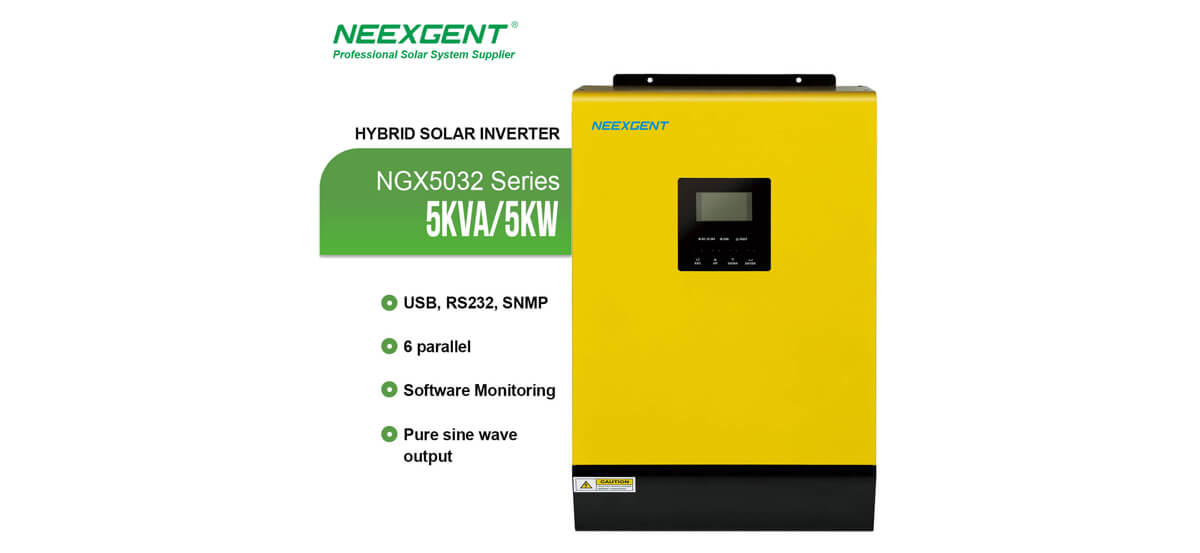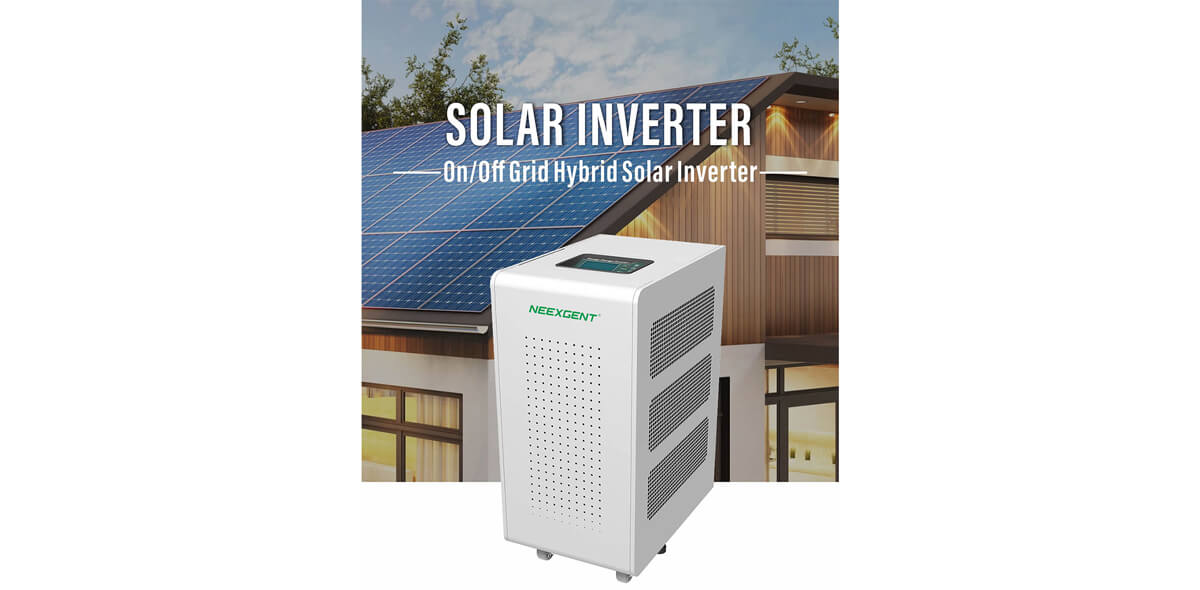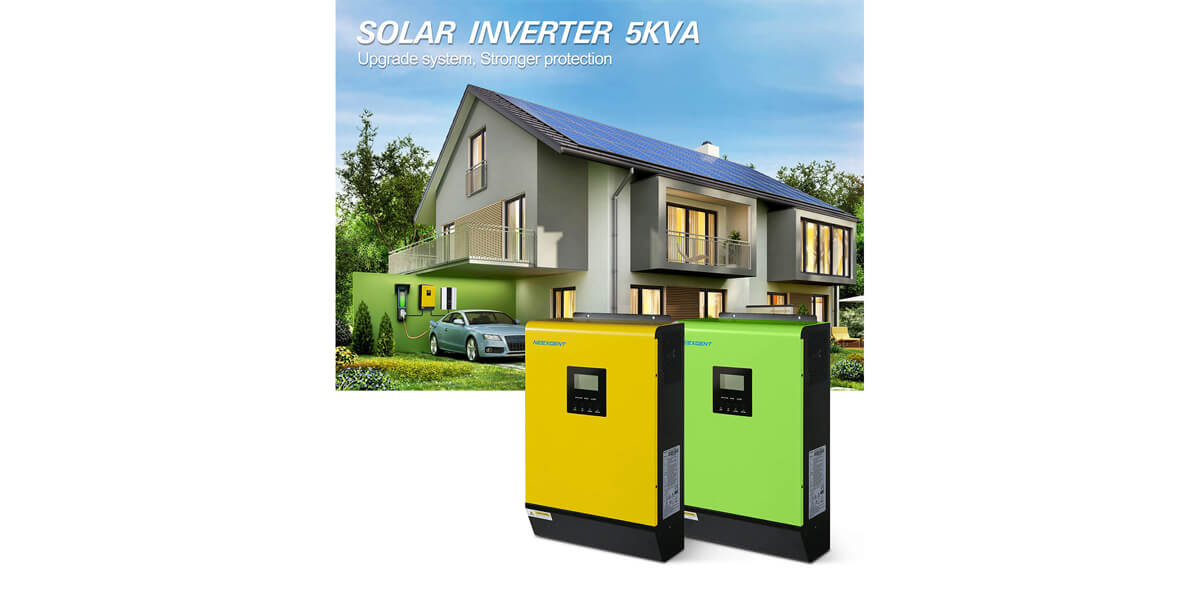
NGX5032 Neexgent Hybrid Solar Inverter
As the world seeks to reduce carbon emissions and adopt renewable energy sources, the adoption of solar energy has increased significantly. South Africa, like many countries around the world, has abundant solar energy potential and has made efforts to tap into this energy source.
A hybrid solar inverter is an essential component of a solar energy system. It is responsible for converting the direct current (DC) generated by solar panels into alternating current (AC) that can be used to power homes and businesses. A hybrid solar inverter can also be used to store excess energy in batteries, which can be used when the solar panels are not generating power.
Hybrid solar inverters are becoming increasingly popular in South Africa. The country has abundant sunshine throughout the year, making it an ideal location for solar energy systems. Additionally, many areas in South Africa are not connected to the national electricity grid, making hybrid solar inverters an attractive alternative to traditional generators.

NG30-10048-T Neexgent Hybrid Inverter
The main advantages of hybrid solar inverters is their ability to store excess energy in batteries. This energy can be used during power outages or when the sun is not shining. This feature is particularly useful in South Africa, where power outages are common.
Another advantage of hybrid solar inverters is their ability to manage the flow of electricity between the solar panels, batteries, and the national grid. This means that homeowners can sell excess energy back to the grid, reducing their electricity bills.
Hybrid solar inverters also have a longer lifespan than traditional generators. They require minimal maintenance and have no moving parts, making them more reliable and cost-effective in the long run.
Hybrid solar inverters are environmentally friendly and produce no harmful emissions. This is in contrast to traditional generators, which rely on fossil fuels and produce harmful greenhouse gases.

Hybrid solar inverters are an attractive alternative to traditional generators in South Africa. They offer a reliable and cost-effective solution for homes and businesses that are not connected to the national grid. With abundant sunshine and a growing interest in renewable energy, hybrid solar inverters are likely to become even more popular in the coming years.
Government policies, there are also financial incentives for homeowners and businesses to install hybrid solar inverters. The South African government offers a tax credit for the installation of renewable energy systems, including solar energy systems. This tax credit can significantly reduce the cost of installing a hybrid solar inverter, making it more affordable for homeowners and businesses.
Another factor driving the adoption of hybrid solar inverters in South Africa is the decreasing cost of solar energy technology. The cost of solar panels and hybrid solar inverters has decreased significantly in recent years, making them more affordable for homeowners and businesses. This has led to an increase in demand for hybrid solar inverters and other renewable energy systems in South Africa.
Hybrid solar inverters in South Africa has also created new opportunities for businesses and entrepreneurs. The solar energy industry in South Africa has grown significantly in recent years, and there are now many companies that specialize in the installation and maintenance of solar energy systems.
The challenges facing the adoption of hybrid solar inverters in South Africa is the lack of access to financing for homeowners and businesses. Many people in South Africa cannot afford the upfront cost of installing a hybrid solar inverter, and there is a need for more accessible financing options.
Hybrid solar inverters are revolutionizing the energy landscape in South Africa. They offer a sustainable and cost-effective solution for harnessing solar power and reducing dependence on traditional energy sources. With abundant sunlight and favorable government policies, hybrid solar inverters are playing a crucial role in achieving the country's renewable energy goals.

The benefits of hybrid solar inverters extend beyond energy generation. They provide energy independence, particularly in areas with unreliable grid connectivity or frequent power outages. By storing excess energy in batteries, hybrid solar inverters ensure a continuous power supply, even during periods of low solar generation or grid failures. This feature is highly beneficial in remote areas, rural communities, and businesses that require uninterrupted power supply.
Hybrid solar inverters contribute to environmental sustainability. They significantly reduce carbon emissions by utilizing clean, renewable energy from the sun. By transitioning to solar power, South Africa can mitigate the environmental impact associated with fossil fuel-based electricity generation and take a significant step towards combating climate change.
Hybrid solar inverters in South Africa also presents economic opportunities. The growth of the solar energy industry has led to the creation of jobs in manufacturing, installation, and maintenance sectors. Local businesses have emerged to cater to the increasing demand for solar energy systems, further stimulating economic growth and promoting entrepreneurship.









